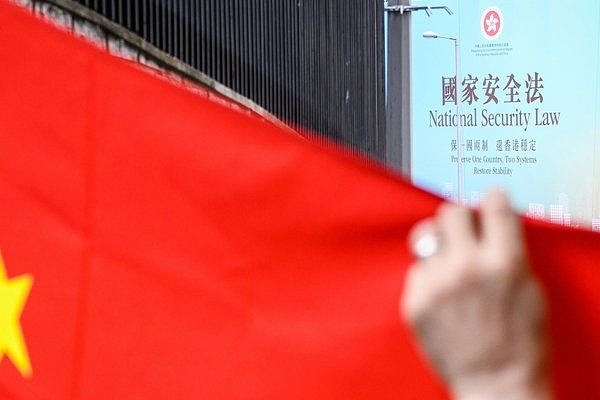News Brief
Explained: China's New National Security Law Sounds Death Knell Of Hong Kong's Freedoms Under One Country Two Systems

New security law has been introduced in Hong Kong by China (Source: @TruthAbtChina/Twitter)
China has reportedly made its first arrests under the new sweeping national security laws imposed on the autonomous region of Hong Kong on Wednesday (30 June) night (local time 23.00).
Yesterday, people took to the street to protest the laws in the busy shopping district of Causeway Bay amidst heavy security presence. Riot police fired pepper spray into the crowd, kettled and dispersed protesters, and deployed water cannons.
Hong Kong police made the first arrests under the new law, including a man who was holding a black independence flag, and then a woman with a sign reading "Hong Kong Independence."
Reportedly, at least 70 people were arrested on Wednesday.
When the bill was first introduced in May this year, thousands had come out on the streets to oppose the law, chanting slogans for “liberation” of Hong Kong from the China. The police had dispersed the march within an hour using tear gas.
What is the new law?
According to a BBC report, the details of the law's 66 articles were kept secret until after it was passed. Even the territory's Chief Executive, Carrie Lam had not seen the full text of the bill before it was passed.
The new law criminalises any act of:
secession - breaking away from the country
subversion - undermining the power or authority of the central government
terrorism - using violence or intimidation against people
collusion with foreign or external forces
The new law's key provisions are as follows:
Crimes of secession, subversion, terrorism and collusion with foreign forces are punishable by a maximum sentence of life in prison
Damaging public transport facilities can be considered terrorism
Those found guilty will not be allowed to stand for public office
Companies can be fined if convicted under the law
Beijing will establish a new security office in Hong Kong, with its own law enforcement personnel - neither of which would come under the local authority's jurisdiction
This office can send some cases to be tried in mainland China - but Beijing has said it will only have that power over a "tiny number" of cases
In addition, Hong Kong will have to establish its own national security commission to enforce the laws, with a Beijing-appointed adviser
Hong Kong's chief executive will have the power to appoint judges to hear national security cases, raising fears about judicial autonomy
Importantly, Beijing will have power over how the law should be interpreted, not any Hong Kong judicial or policy body. If the law conflicts with any Hong Kong law, the Beijing law takes priority
Some trials will be heard behind closed doors
People suspected of breaking the law can be wire-tapped and put under surveillance
Management of foreign non-governmental organisations and news agencies will be strengthened
The law will also apply to non-permanent residents and people "from outside [Hong Kong]... who are not permanent residents of Hong Kong"
How will it affect Hong Kong?
According to the 1997 agreement between China and Britain, Hong Kong is supposed to remain under ‘one country, two systems’ until 2047. The agreement secured some democratic freedoms for the Hong Kongers that are not available to the mainland Chinese under the communist rule.
Critics argue that the new laws mean that the autonomy of Hong Kong is effectively over.
Hong Kong is currently the only common law jurisdiction in China. There are fears that with the new law, its judicial independence will be over and its judicial system will become same as mainland China's.
"Effectively, they are imposing the People's Republic of China's criminal system onto the Hong Kong common law system, leaving them with complete discretion to decide who should fall into which system,” Professor Johannes Chan, a legal scholar at the University of Hong Kong was quoted as saying by BBC.
He added that the law will have a severe impact on freedom of expression, if not personal security, on the people of Hong Kong.
Already reports are coming of people deleting Facebook posts and social media accounts. Several political and activist groups formally disbanded in advance of the law being introduced Monday. The shopkeepers tore down posters that supported anti-government protests.
The pro-democracy activists like Joshua Wong who have been lobbying foreign governments to help their cause can now be charged under the new law. Reportedly, Wong has now quit his Demosisto party.
Introducing ElectionsHQ + 50 Ground Reports Project
The 2024 elections might seem easy to guess, but there are some important questions that shouldn't be missed.
Do freebies still sway voters? Do people prioritise infrastructure when voting? How will Punjab vote?
The answers to these questions provide great insights into where we, as a country, are headed in the years to come.
Swarajya is starting a project with an aim to do 50 solid ground stories and a smart commentary service on WhatsApp, a one-of-a-kind. We'd love your support during this election season.
Click below to contribute.
Latest